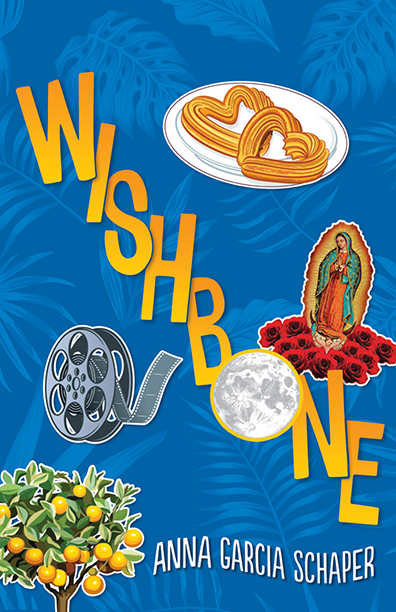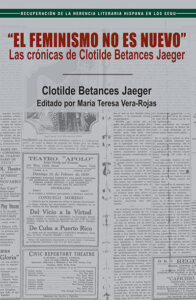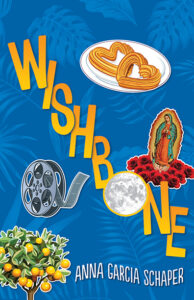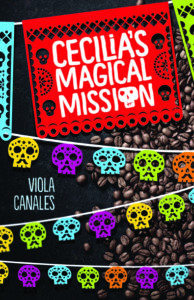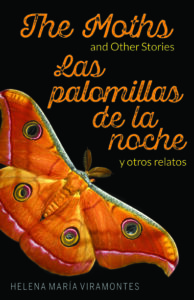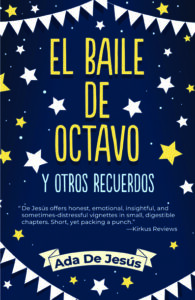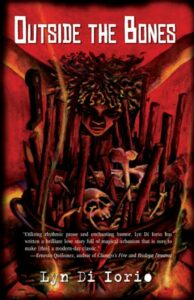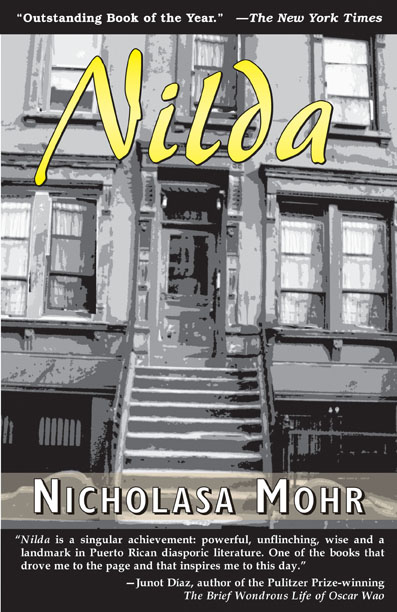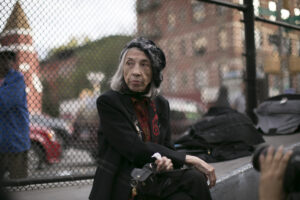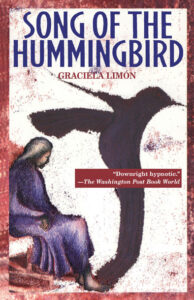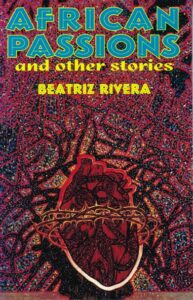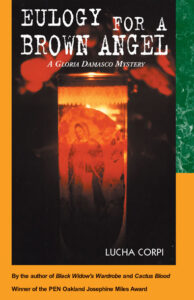Amplify Your Library with Women Centric Writings
“El feminismo no es nuevo”: Las crónicas de Clotilde Betances Jaeger
by Clotilde Betances Jaeger
Edited by María Teresa Vera-Rojas
“Every woman who gets accustomed to the yoke of marriage remains a slave,” Clotilde Betances Jaeger wrote in an article published in 1929. This revolutionary idea, which scandalized society at the time of its publication, reflects her passionate ideas in this collection of essays and articles that shines a light on the women’s movement in the first half of the twentieth century in New York’s Hispanic community.
Clotilde Betances Jaeger was a Puerto Rican feminist, writer and intellectual who, in addition to championing women’s rights, advocated for racial equality, education rights and Puerto Rican independence. She questioned the role of the church, reflected on marriage and highlighted women’s roles in education, the economy and politics. Her writing was a call to arms, encouraging women to fight for their emancipation: “Woman, mother, wife, daughter, alone you have no impact. But join the other women that suffer the same trials and you will see how your efforts multiply, you will see how you crush your enemies.”
Edited by scholar María Teresa Vera-Rojas, this volume contains Betances Jaeger’s pieces that appeared between 1920 and 1940 in Spanish-language publications in New York, including Gráfico, Artes y Letras and La Prensa. It also includes some articles printed in Puerto Rico and the Spanish anarchist press. This is a fundamental text that brings to light the historic role of Latinas in the fight for equal rights, and Betances Jaeger’s writing remains as important today as when first published.
by Anna Garcia Schaper
Pilar’s mother has been extra vigilant about her fifteen-year-old daughter’s diet after she came home from school in tears. The truth is, Pilar wouldn’t mind losing some weight. She dreams of becoming an actor and wants to try out for the school production of “Our Town,” but she’s reminded constantly that she’s too ugly, too fat, too Mexican.
With the encouragement of some new friends and her feisty grandmother who thinks she’s perfect just the way she is, Pilar works up the nerve to try out for the play—in spite of continued harassment by Becca Barlowe and her posse. But when a handsome high school jock plays a mean trick on her that becomes a social media sensation, Pilar once again finds herself using food to anesthetize her pain.
This appealing novel for mature teens juxtaposes Pilar’s story with her grandmother’s when she was married to a male chauvinist years earlier in Laredo, Texas. Both women must struggle to find their own voice in a world where others insist on defining them as “less than.” Capturing the heartache of seeking—and accepting—one’s true self, Anna Garcia Schaper movingly explores the strength of family bonds and their importance in overcoming difficult and sometimes tragic circumstances.
by Viola Canales
Everyone in fourteen-year-old Cecilia’s Mexican-American community has a don—a special gift or talent. Her father, who’s named after St. Anthony, helps people find things, or parts of themselves, that they’ve lost. Paco, the janitor in the building where she lives, can tell fortunes. Cecilia can’t figure out hers, and she really needs to since her confirmation is coming up.
The truth is, Cecilia doesn’t really believe people have celestial gifts. Her opinion begins to change when she gets apprenticed to Doña Faustina, who has a magic way with coffee. Soon Cecilia realizes that her apprenticeship involves something more sinister than a mystical brew! And on a trip back to the special Mexican village of Santa Cecilia, she and her friends Julie and Lebna learn something about friendship, community and the powers of good and evil.
Award-winning author Viola Canales returns with an appealing novel for teens that highlights a Mexican-American immigrant community and the conflict first-generation young adults experience caught between contemporary American life and their parents’ traditional ways.
The Moths and Other Stories / Las palomillas de la noche y otros relatos
by Helena María Viramontes
The adolescent protagonist of the title story, like other girls in this pioneering collection, rebels against her father, refusing to go to Mass. Instead, dressed in her black Easter shoes and carrying her missal and veil, she goes to her abuelita’s house. Her grandmother has always accepted her for who she is and has provided a safe refuge from the anger and violence at home.
The eight haunting stories included in this collection explore the social, economic and cultural impositions that shape women’s lives. Girls on the threshold of puberty rebel against their fathers, struggle to understand their sexuality and, in two stories, deal with the ramifications of pregnancy. Other women struggle against the limitations of marriage and the Catholic religion, which seek to keep them subservient to the men in their lives. Prejudice and the social and economic status of Chicanos often form the backdrop as women fight—with varying degrees of success—to break free from oppression.
Shedding light on the complex lives and experiences of Mexican-American girls and women, this bilingual edition containing the first-ever Spanish translation of Viramontes’ debut collection, The Moths and Other Stories, will make this landmark work available to a wider audience.
El baile de octavo y otros recuerdos / The Eighth Grade Dance and Other Memories
by Ada De Jesús
Eleven-year-old Ada De Jesús was on the cusp of her teens when she moved to the United States from Puerto Rico. Hurricane Hugo had just decimated the island and her father couldn’t find a job.
In Chicago, the white dress she arrived in didn’t protect her from the snow and frigid temperatures! Constantly exposed to new things, she developed a resilience that served her well. “From one place to another, like riding a bike, if you keep pedaling, you won’t fall.”
Ada discovered that students in the United States were frequently disrespectful to their teachers. At school she often felt like a two-year-old as she grappled with a completely new language. In addition to navigating a different culture, she had to deal with all the issues familiar to teenage girls: the growth of body hair, pimples, menstruation and of course boys! Her memories of first intimate encounters, fending off unwanted advances and fear of pregnancy will strike a chord with readers.
In these short vignettes recollecting her middle-school years, Ada De Jesús shares her poignant and often funny experiences as a newcomer and an adolescent. Young readers will relate to—and laugh at—her experiences; some may take heart that they too will overcome the difficulties common at this age.
by Alex Temblador
Sixteen-year-old Martha and her mother move constantly, never staying anywhere for long. So she knows better than to ask if they’ve been evicted again when her mom says they’re going on a “vacation” to Laredo, Texas, to meet the grandmother Martha didn’t know existed. At her Abuela’s pink house, Martha’s shocked and hurt when her mom abandons her, even though a part of her had been expecting it.
Suddenly, Martha must deal with a lifestyle that is completely foreign. And it turns out that her grandmother is revered as a healer, or curandera. Meanwhile, at Martha’s new school, she can’t be anonymous because everyone knows she’s Doña González’s granddaughter, and a girl named Marcella has it out for her. As Martha struggles to adjust to her new life, she can’t help but wonder why her mother left Laredo. No one is willing to discuss it, so she’ll have to unravel the secrets herself.
The Curse of the Gypsy: Ten Stories and a Novella
by Alicia Gaspar De Alba
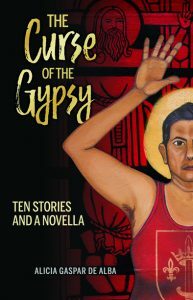 In the first story of this absorbing collection, Margarita—sixteen and married to a soldier who has gone off to fight in the first great war—meets and falls in love with Federico García Lorca. When he refuses to marry the widowed gypsy girl after a tryst at the river leaves her pregnant, her mother curses both Lorca and his offspring: “May they all die before they see the light of day.” And so Lorca is killed by fascists and his child dies in Margarita’s womb, where it remains—petrified—for 80 years.
In the first story of this absorbing collection, Margarita—sixteen and married to a soldier who has gone off to fight in the first great war—meets and falls in love with Federico García Lorca. When he refuses to marry the widowed gypsy girl after a tryst at the river leaves her pregnant, her mother curses both Lorca and his offspring: “May they all die before they see the light of day.” And so Lorca is killed by fascists and his child dies in Margarita’s womb, where it remains—petrified—for 80 years.
Mysteries and furtive desires pervade the enthralling stories in this group of ten the author calls a “deconstructed novel.” Expertly weaving poetry, historical events, myth and legend into intriguing short fiction, Alicia Gaspar de Alba confirms her place as one of the leading contemporary Latinx voices.
by Diana J. Noble
 It’s the summer of 1911 in northern Mexico, and soon the de León family learns that the rumors of soldiers in the region are true.
It’s the summer of 1911 in northern Mexico, and soon the de León family learns that the rumors of soldiers in the region are true.
Evangelina’s father decides they must leave their home to avoid the violence. The trip north to a small town on the U.S. side of the border is filled with fear and anxiety as they worry about loved ones left behind and the uncertain future ahead.
Life in Texas is confusing, though the signs in shop windows that say “No Mexicans” and some people’s reactions to them are all-too clear. Why can’t people understand that—even though she’s only starting to learn English—she’s just like them? This moving historical novel introduces teens to the tumultuous times of the Mexican Revolution and the experiences of immigrants, especially Mexican Americans, as they adjust to a new way of life.
Fina is a big girl with a big mouth. She’s the neighborhood bruja, or “spirit worker” as she likes to call herself, casting spells for her neighbors in Manhattan’s Upper West Side. She can’t believe it, though, when she puts an accidental fufú—or spell—on Chico, the irresistible trumpet-player who lives upstairs.
Weaving Afro-Caribbean witchcraft rituals with the sixteen-year-old mystery of a woman’s disappearance, Outside the Bones is an erotically charged ghost story set in both present-day New York and Puerto Rico. Following in the tradition of Anne Rice, Lyn Di Iorio’s brilliant debut novel takes a mesmerizing look at issues of race, class, power and greed.
by Nicholasa Mohr
“Damn you bastards, coming here making trouble. Bunch of animals.” The two police offers responding to a call about an open fire hydrant lash out furiously at the Puerto Rican residents of New York City’s El Barrio neighborhood. It’s the summer of 1941, and all ten-year-old Nilda wants to do is enjoy the cool water with her friends. But the policemen’s curses end their fun, and their animosity is played out over and over again in Nilda’s life. She is repeatedly treated with contempt and even disgust by adults in positions of authority: teachers, nurses and social workers.
Named an “Outstanding Book of the Year” by The New York Times and one of the “Best Books of the Year” by the American Library Association in 1973 when it was first published, Nicholasa Mohr’s classic novel about life as an immigrant in New York City offers a poignant look at one young girl’s experiences. Issues of race, religion and machismo are realistically and movingly depicted in this groundbreaking coming-of-age novel that was one of the first by a Latina author to be hailed by the mainstream media.
by Graciela Limón
From Aztec princess to slave and concubine, Hummingbird – or Huitzitzilín in her native Nahuatl – recounts her life during the Spanish conquest of Mexico. She experienced first-hand the wonder of gods’ arrival—those bearded, armored men who descended from their vessels on horseback—and the brutal devastation of her land and her people. She witnessed the obliteration of Tenochtitlán and suffered the loss of her identity, being forced to discard her traditional garb, to speak a language foreign to her tongue, and to forsake her ancestral gods.
In Song of the Hummingbird, Limón pays homage to the pre-Columbian woman, celebrates the endurance of the human spirit in the face of cataclysm and mourns our collective loss of treasures more valuable than all the plundered gold.
To the Last Man I Slept With and All the Jerks Just Like Him
by Gwendolyn Zepeda
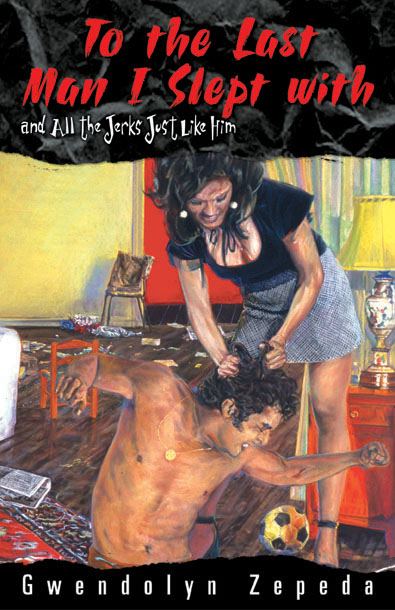
With dark, knife-in-the ribs humor and poignant glimpses of youth and early adulthood, Gwendolyn Zepeda’s first book is the literati’s version of television variety shows of the 1970s. Chock full of sharp observations in a narrative that jumps from personal essay to a parody of romance novels to inventive fiction, this collection spans a wide range of themes: the complications of being a “half-white child of hippies born in Houston in 1971″ and raised in a largely Mexican barrio . . . “How to Be a Trailer Trash Housewife” . . . and a midnight dance with a giant cockroach.
Weaving her exploration of family life, love, the struggle for economic stability, and the search for a personal creative space, Zepeda’s brash voice cuts at society’s stereotypes, at once critiquing those around her and herself. Not for the shy or the meek, Zepeda’s bold ruminations ring clearly through all her pieces, whether tough dramatizations or tongue-in-cheek fiction.
African Passions and Other Stories
by Beatriz Rivera
African Passions, Beatriz Rivera’s first collection of stories, is peopled by Hispanic women in the thrall of love of varying sorts, but always of overwhelming intensity. Passion, obsession, raucous humor, and satire are in store for the reader of this tour-de-force examination of Latina womanhood.
A series of strong-minded women relentlessly pursue love and success as they move in and out of the reality of the New Jersey Hispanic barrio that bonds them: a frustrated professional woman who unsuccessfully strives for a wedding ring from her mama’s-boy lover, a recent college graduate applies for dead-end jobs while pursuing a traditional macho lover, an Italian-Puerto Rican princess gets caught up in a vicious cycle of destructive relationships, and a young Cuban matron wrecks husband, children, and her own well-being as she seeks the nirvana of material wealth and status.
Eulogy for a Brown Angel / Loa a un ángel de piel morena: Serie detectivesca “Gloria Damasco”
by Lucha Corpi
A Chicano Civil Rights March has been disrupted by the Los Angeles police, resulting in the gruesome death of a prominent reporter. The tear gas has barely settled when a small, defiled body is left on a street in Los Angeles. A feisty political activist finds the murdered child and begins an investigation that will lead her on a trail of international conspiracy and bloody vengeance. Before long, two other people are dead, and dynamic detective Gloria Damasco is determined to piece the mystery together, no matter how long the search may last.
Eulogy for a Brown Angel is a fast-paced and suspenseful novel, packed with an assortment of interesting characters. A member of the international writers’ circle Sisters in Crime, Lucha Corpi brings the intrigue to a hard-hitting conclusion in the picturesque Wine Country of Northern California.





